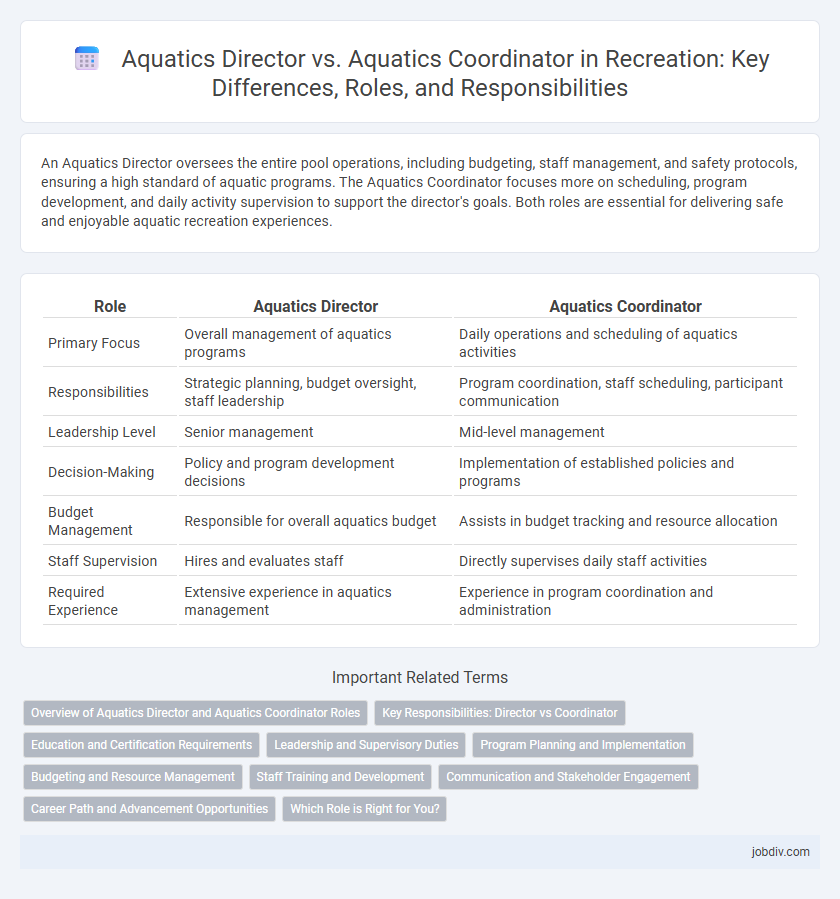An Aquatics Director oversees the entire pool operations, including budgeting, staff management, and safety protocols, ensuring a high standard of aquatic programs. The Aquatics Coordinator focuses more on scheduling, program development, and daily activity supervision to support the director's goals. Both roles are essential for delivering safe and enjoyable aquatic recreation experiences.
Table of Comparison
| Role | Aquatics Director | Aquatics Coordinator |
|---|---|---|
| Primary Focus | Overall management of aquatics programs | Daily operations and scheduling of aquatics activities |
| Responsibilities | Strategic planning, budget oversight, staff leadership | Program coordination, staff scheduling, participant communication |
| Leadership Level | Senior management | Mid-level management |
| Decision-Making | Policy and program development decisions | Implementation of established policies and programs |
| Budget Management | Responsible for overall aquatics budget | Assists in budget tracking and resource allocation |
| Staff Supervision | Hires and evaluates staff | Directly supervises daily staff activities |
| Required Experience | Extensive experience in aquatics management | Experience in program coordination and administration |
Overview of Aquatics Director and Aquatics Coordinator Roles
Aquatics Directors manage overall aquatic facility operations, including budgeting, staff supervision, and safety protocol enforcement, ensuring optimal program development and compliance with regulations. Aquatics Coordinators focus on organizing swim programs, coordinating schedules, and supporting lifeguard and instructor staff to facilitate daily aquatic activities. Both roles prioritize water safety and recreational programming but differ in strategic oversight versus operational execution.
Key Responsibilities: Director vs Coordinator
The Aquatics Director oversees the entire aquatic facility, managing staff, budget, and compliance with safety regulations to ensure efficient operations and high-quality programming. In contrast, the Aquatics Coordinator focuses on organizing daily activities, scheduling swim lessons, and coordinating event logistics while supporting staff training and participant engagement. Both roles require strong leadership but differ in strategic management versus operational execution within recreation aquatics.
Education and Certification Requirements
Aquatics Directors typically require advanced certifications such as WSI (Water Safety Instructor), CPR instructor qualifications, and often a bachelor's degree in recreation management or a related field to ensure comprehensive program oversight. Aquatics Coordinators usually hold certifications like Lifeguard Training and Basic Water Safety Instructor credentials, with a high school diploma or associate degree sufficing for entry-level management roles. Both positions demand knowledge of safety protocols and emergency response, but Directors are expected to have higher educational credentials and extensive leadership training.
Leadership and Supervisory Duties
An Aquatics Director oversees the entire aquatics program, providing strategic leadership, managing budgets, and ensuring compliance with safety regulations, while an Aquatics Coordinator focuses on supervising day-to-day pool operations and staff scheduling. The Director leads multi-disciplinary teams and develops long-term program goals, whereas the Coordinator implements these directives and handles direct staff supervision. Strong leadership skills in the Director role drive program growth, while the Coordinator's supervisory duties ensure smooth operational execution.
Program Planning and Implementation
Aquatics Directors oversee comprehensive program planning and implementation, ensuring alignment with safety standards, budget management, and staff training. Aquatics Coordinators focus on executing specific aquatic programs, coordinating daily activities, and assisting in resource allocation. Both roles prioritize enhancing participant engagement and maintaining regulatory compliance in aquatic recreational settings.
Budgeting and Resource Management
Aquatics Directors oversee comprehensive budgeting for aquatic facilities, ensuring efficient allocation of funds to meet operational and maintenance needs. Aquatics Coordinators focus on managing daily resource distribution, including staff scheduling and equipment usage, to optimize program delivery within the established budget. Both roles require strategic financial planning but differ in scope, with Directors handling long-term budget development and Coordinators managing tactical resource deployment.
Staff Training and Development
Aquatics Directors oversee comprehensive staff training programs to ensure certifications, safety protocols, and leadership skills are consistently updated across the team. Aquatics Coordinators focus on day-to-day training sessions, monitoring staff performance, and facilitating skill development for lifeguards and instructors. Both roles are critical in maintaining high standards of safety and professional growth within aquatic facilities.
Communication and Stakeholder Engagement
Aquatics Directors lead strategic communication efforts and engage key stakeholders such as community leaders, municipal officials, and funding partners to align aquatic programs with organizational goals. Aquatics Coordinators focus on day-to-day communication with staff, instructors, and participants, ensuring smooth operational flow and immediate issue resolution. Both roles require strong interpersonal skills but differ in scope, with Directors prioritizing high-level stakeholder relations and Coordinators emphasizing internal team engagement.
Career Path and Advancement Opportunities
Aquatics Directors typically oversee entire aquatic programs, managing staff, budgets, and facility operations, which positions them for upper-level management roles in recreation or municipal departments. Aquatics Coordinators focus more on daily program implementation and staff scheduling, providing foundational experience for moving into director roles or specialized program management. Career advancement from coordinator to director involves gaining leadership skills, certifications such as Certified Pool Operator (CPO), and experience in budget management and strategic planning.
Which Role is Right for You?
Aquatics Directors typically manage overall facility operations, including budgeting, staff supervision, and program development, making this role ideal for individuals seeking leadership and strategic responsibilities in recreation. Aquatics Coordinators focus more on organizing daily activities, scheduling staff, and ensuring safety protocols, suited for those who prefer hands-on program management and direct engagement with aquatic programs. Choosing the right role depends on your career goals, leadership skills, and preference for administrative versus operational tasks within the aquatics field.
Aquatics Director vs Aquatics Coordinator Infographic

 jobdiv.com
jobdiv.com